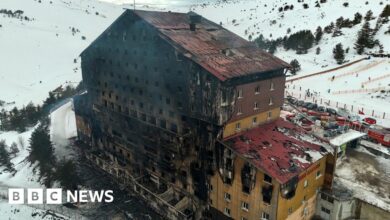Building influence with war tours and graffiti
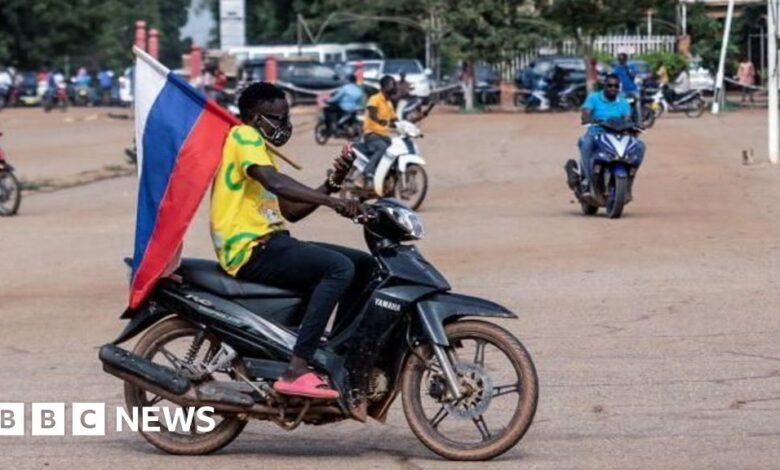
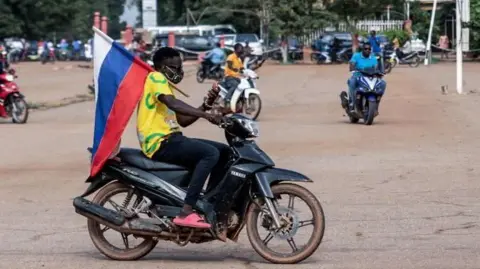 AFP
AFPTeenage soccer players listen to the Russian national anthem before the match. Nearby, artists paint portraits of Russian President Vladimir Putin on a wall during a graffiti festival.
Welcome to Burkina Faso, one of the African countries where Russia is stepping up its efforts to increase its influence.
Evidence found by the BBC shows Russia is using media and cultural initiatives to attract African journalists, influencers and students while spreading disinformation.
These events are being promoted by the Africa Initiative, a newly formed Russian media organization that defines itself as an “information bridge between Russia and Africa.” It inherits structures previously set up by the now-defunct Wagner mercenary group and is believed by experts to have links to Russian security services.
Registered in September 2023, a month after Wagner leader Yevgeny Prigozhin died in a plane crash, the Africa Initiative welcomed former employees from his dissolved businesses.
The organization’s efforts are particularly focused on three military-run countries: Mali, Niger and Burkina Faso.
After recent coups, these West African nations have shunned Western allies like France, criticizing their failed interventions against jihadist groups and colonial legacy. Instead, they have turned to Russia.
In addition to local cultural events, the Africa Initiative maintains a news website with stories in Russian, English, French and Arabic, as well as a video channel and five Telegram channels, one of which has nearly 60,000 subscribers.
Several Telegram channels were “recycled” from older channels set up by Wagner-affiliated groups. They were the first to promote the Russian Defense Ministry’s Africa Corps paramilitary group, which has effectively replaced Wagner’s military wing in West Africa.
Pro-Kremlin narratives and disinformation, especially about the United States, are rampant.
Stories on the Africa Initiative website make evidence-free claims that the United States is using Africa as a bioweapons production and testing ground, drawing on long-discredited Kremlin disinformation campaigns.
One story echoed the Kremlin’s baseless claims that US bio-labs were being relocated from Ukraine to Africa. Another story asserted without evidence that US bio-labs on the continent were increasing, claiming that “under the guise of research and humanitarian projects, the African continent is becoming a testing ground for the Pentagon,” implying that secret bio-labs were being conducted.
While Prigozhin’s propaganda efforts were largely aimed at France, the Africa Initiative “targets the Americans to a greater extent,” said researcher Jedrzej Czerep, head of the Middle East and Africa Program at the Polish Institute of International Relations. “It’s much more anti-American.”
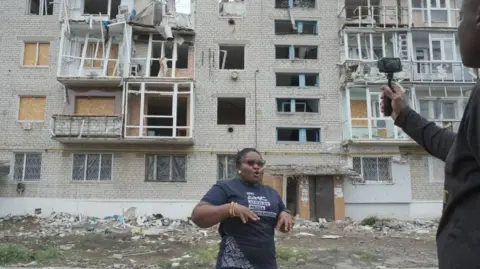 Russdiary (Telegram channel)
Russdiary (Telegram channel)In June, a group of bloggers and reporters from eight countries were invited to take part in a seven-day “press tour” of Russian-occupied areas of Ukraine. The trip was organized by Russian state media and Western-sanctioned Russian officials, and the journalists visited the headquarters of the Africa Initiative in Moscow.
“Africa doesn’t get much information. [about the war]“Whatever information we get is not convincing enough for us to understand the true nature of the war,” Raymond Agbadi, a Ghanaian blogger and scientist who studied in Russia and took part in the “press tour,” told the BBC.
American influencer Jackson Hinkle, a strong supporter of Russian President Vladimir Putin and a prolific proponent of false claims about Ukraine, was also on the visit.
After visiting Moscow, the journalists traveled 1,250km (780 miles) to the Ukrainian port city of Mariupol in the Donetsk region. They then traveled to towns in the Zaporizhzhia region – all areas that were seized by Russia at the beginning of its full-scale invasion of Ukraine.
Throughout the visit, reporters were accompanied by Russian officials and traveled with Russian troops in vehicles marked with the letter Z – a symbol of Russia’s invasion of Ukraine.
In May, the Africa Initiative organized a private “press tour” to Russian-occupied Mariupol for a delegation of bloggers from Mali.
Press tours for journalists are a widely used tool to try to sell a country’s point of view. But while “Western media conduct many progressive training programs [for journalists] “In order to cover key topics that have become of global concern, Russia uses these guided tours as a way to spread certain narratives,” said Beverly Ochieng, a senior analyst at Control Risks and the Center for Strategic and International Studies, noting that China also organizes similar tours.
Ms Ochieng said the African journalists’ coverage of their trip gave “an impression of authenticity” because they were “reaching audiences in languages they know”, rather than looking like it was part of a “broader campaign to portray Russia in a positive light”.
In articles published after the trip, African journalists called Ukrainian cities occupied by Russian forces “Russian conflict zones” and quoted Russian-installed authorities, repeating Russian state propaganda and presenting the Kremlin’s view of Ukraine’s borders.
In an article published on JoyOnline, an English-language website operated by Multimedia Group, Ghanaian journalist Ivy Setordjie wrote that Ukraine’s Zaporizhzhia region [whose capital is under Ukrainian control]”located in the south of European Russia.”
She told the BBC that she did not agree that the regions were illegally annexed by Russia, insisting that her reports reflected her own judgement and were “unbiased” towards the country.
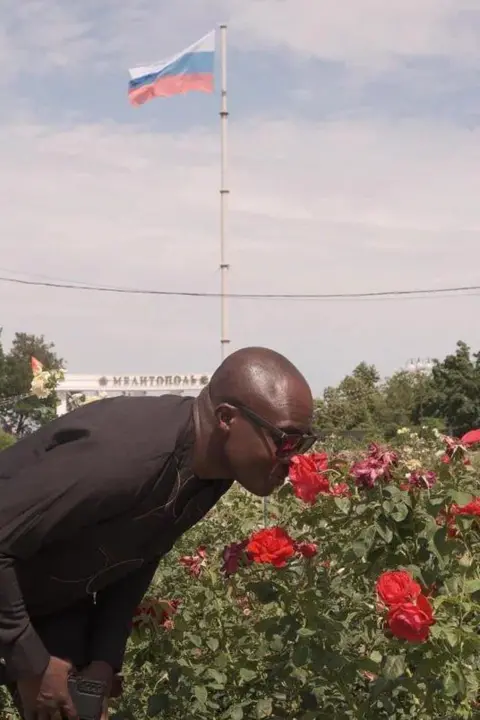 mariupol-news.ru
mariupol-news.ruIn addition to press trips, local branches of the Africa Initiative in the Sahel region of West Africa have been actively involved in outreach efforts aimed at raising Russia’s profile.
The BBC has been monitoring the Africa Initiative’s Telegram channels and Facebook page, which share videos, images and reports of their work on the ground.
In Burkina Faso, we found reports of a soccer competition featuring the Russian national anthem, “friendship lessons” in schools where students were taught about Russia, a Soviet “sambo” martial art competition, first aid workshops for civilians and police, and a graffiti festival where participants painted Russian President Vladimir Putin alongside former Burkina Faso leader Thomas Sankara, all sponsored by the Africa Initiative.
Images also showed members of the Africa Initiative distributing groceries to locals and a screening of the Wagner-sponsored documentary The Tourist, which follows a group of Wagner instructors in the Central African Republic, where Wagner and its affiliates have visited. helped the government fight rebels for many years.
“The initial idea of the Africa Initiative was to scrap everything Prigozhin had developed and replace it with something new. Later in the process, it seemed more logical to reuse all the assets that were already there,” said Czerep, a researcher at the Polish Institute of International Relations.
The FSB, Russia’s Federal Security Service, plays a key role in the new organization, he noted. The head and editor-in-chief of the Africa Initiative is Artyom Kureyev, identified by Russian experts as a Russian FSB agent. Mr. Kureyev has ties to the Valdai Club, a Moscow-based think tank close to President Putin.
The Africa Initiative website lists Anna Zamaraeva, a former Wagner press officer, as deputy editor-in-chief.
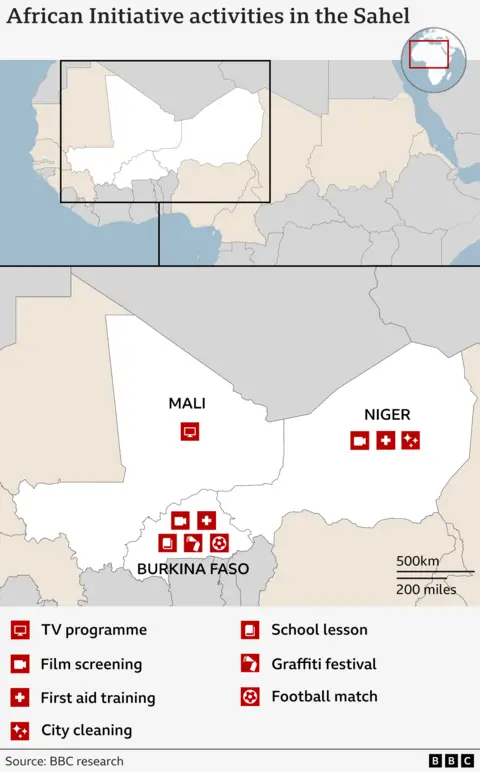
Viktor Lukovenko, known as one of Prigozhin’s “political technologists,” founded the Africa Initiative’s Burkina Faso office but has left the post in recent months. A former Russian nationalist with a criminal past, Mr Lukovenko served five years in prison for a fatal attack on a Swiss citizen in Moscow.
We reached out to the African Initiative for comment. Their Moscow office confirmed receipt of our query but did not respond. We also reached out to the Russian government but did not receive a response.
In February, in response to the US State Department report, an article on the Africa Initiative website stated that its editorial board “affirms that its purpose is to spread knowledge about Africa in Russia and disseminate information about Russia in African countries”, giving “many Africans the opportunity to be heard, including their criticism of Western countries”.
Meanwhile, the organization continues to increase its activities in the Sahel. In the last week of August, about 100 students in Burkina Faso attended a talk about training opportunities in Russia.
“I learned about Russian culture and the relationship between our two governments,” a smiling teenager wearing an Africa Initiative logo T-shirt shared in a video recorded after the discussion.




